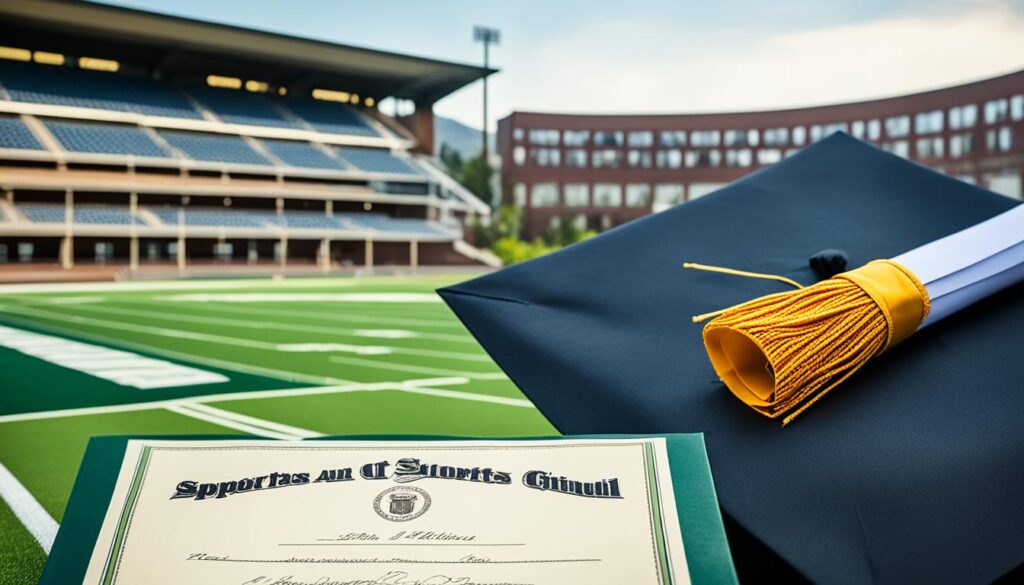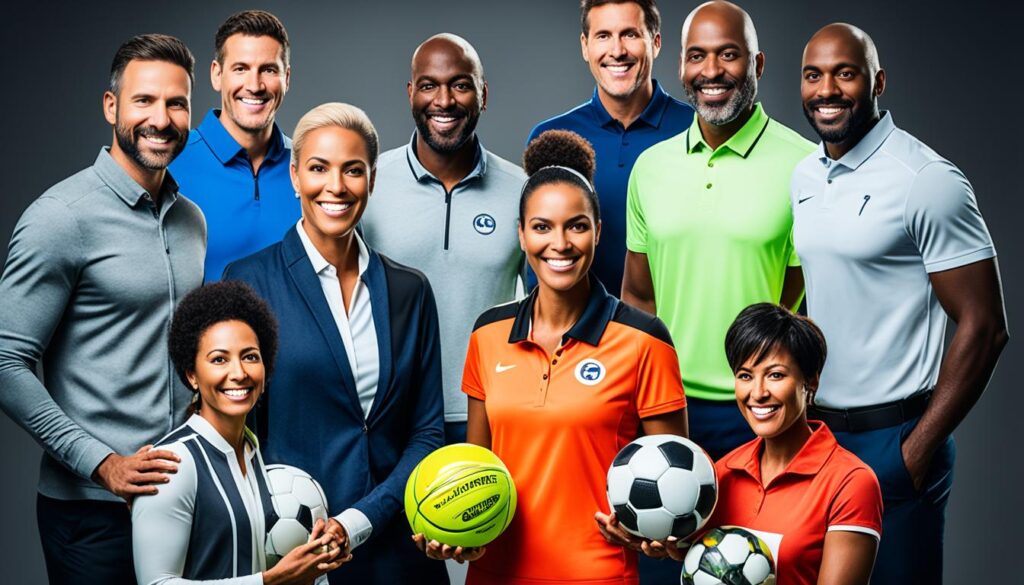To become a sports agent, you’ll need to have a thorough understanding of the industry and possess specific skills. The role of a sports agent is multifaceted and requires expertise in athlete representation, contract negotiations, marketing, and scouting. Successful sports agents can earn a significant income through commissions. It’s important to have a degree in sports management or a related field and gain experience through internships. Negotiation skills are crucial in this role, and being passionate about sports is essential to thrive in the industry.
Key Takeaways:
- Become a sports agent by gaining a thorough understanding of the industry and acquiring specific skills.
- Earn a significant income through commissions as a successful sports agent.
- Pursue a degree in sports management or a related field and gain experience through internships.
- Develop strong negotiation skills and have a passion for sports.
- Continuously stay updated with industry trends and developments.
The Duties and Responsibilities of a Sports Agent
Sports agents play a pivotal role in the athletic industry, taking on various duties and responsibilities to ensure the success and well-being of their clients. These professionals are more than just negotiators; they are talent scouts, marketing managers, press directors, and trusted advisors. Let’s explore the diverse and demanding responsibilities of a sports agent:
Talent Scout
As talent scouts, sports agents actively seek out promising athletes, scouring amateur leagues, college competitions, and other sporting events to identify individuals with potential. They carefully evaluate athletes’ skills, performance, and marketability to determine their suitability for professional representation.
Marketing Manager and Press Director
Sports agents also act as marketing managers and press directors for their clients. They handle media inquiries, arrange interviews, and strategize public relations efforts to promote their clients’ image and brand. By effectively managing their clients’ public image, agents can maximize exposure and endorsement opportunities.
Seeking New Opportunities
In addition to talent scouting and reputation management, sports agents are constantly on the lookout for new opportunities for their clients. They explore endorsement deals, sponsorships, and other collaborations to enhance athletes’ income and exposure. By securing lucrative partnerships, agents ensure their clients’ financial success both on and off the field.
Mediating Disputes
Disputes can arise in any professional relationship, and sports agents are responsible for mediating and resolving conflicts on behalf of their clients. Whether it’s contract disputes between athletes and teams or conflicts with sponsors or endorsers, agents must navigate these challenges as hard-nosed negotiators, protecting the best interests of their clients.
Listening and Organized Communication
Being an effective sports agent involves being an attentive listener and an organized communicator. Agents must actively listen to their clients, understanding their needs and goals, and communicate those desires clearly to teams, sponsors, or other stakeholders. Clear and concise communication is essential for negotiating contracts, managing finances, and coordinating various aspects of their clients’ careers.
As we can see, the role of a sports agent extends far beyond contract negotiations. These professionals serve as trusted advisors, mentors, and advocates for their clients, guiding them through the complexities of the sports industry. With their diverse skill set and relentless dedication, sports agents play a crucial role in shaping the careers and futures of athletes worldwide.
Steps to Become a Sports Agent
The path to becoming a sports agent involves several important steps that will help you establish a successful career in this dynamic industry. Let’s explore the key factors that can pave the way to becoming a sports agent.
- Educational Foundation: While a law degree is not mandatory, having a solid understanding of contracts and legal terminology can be highly beneficial. It’s essential to stay informed about the sports industry and gain knowledge about the sport(s) you’re interested in representing.
- Formal Education: Most sports associations require a bachelor’s degree, preferably in sports management or a related field. Pursuing a formal education in sports management provides a comprehensive understanding of the industry, including areas such as marketing, finance, and athlete representation.
- Industry Experience: Gaining practical experience through internships and entry-level positions is crucial. This hands-on experience allows you to learn the intricacies of the industry, build a professional network, and develop the skills necessary for success.
- Licensing and Certification: In many cases, obtaining a license, certification, or registration is required to work as a sports agent. Each sports association or state has its own specific requirements and application process. These credentials demonstrate your credibility and professionalism as a sports agent.
- Networking: Building a strong network of industry professionals, athletes, coaches, and scouts is essential for finding job opportunities and establishing your reputation as a sports agent. Attend industry events, join professional organizations, and engage with others in the sports industry to expand your connections.
By following these steps, you can position yourself for a successful career as a sports agent, equipped with the necessary education, experience, and network to excel in this competitive field.

Getting a Formal Education in Sports Management
A formal education in sports management is crucial for individuals aspiring to become sports agents. Many sports associations require at least a bachelor’s degree in sports management or a related field, while advanced degrees are often recommended for professional certifications.
Undergraduate degree programs in sports management provide comprehensive coursework that covers various aspects of the sports industry. These programs offer courses in sports marketing, data analysis, and sports law, providing students with a solid foundation in the fundamental principles of managing sports organizations and athlete representation.
Advanced degree options, such as a Master of Business Administration (MBA) degree or a Juris Doctor (JD) degree, offer specialized knowledge and expertise in specific areas of sports management. An advanced degree can open doors to advanced career opportunities and positions of leadership within the sports industry.

“A formal education in sports management equips aspiring sports agents with the necessary knowledge and skills to excel in the highly competitive sports industry.”
By pursuing a formal education in sports management, individuals gain a deep understanding of sports marketing strategies, sports law and regulation, and the analysis of sports-related data. These skills are invaluable for sports agents who need to negotiate contracts, secure endorsement deals, and navigate the legal complexities of the industry.
Moreover, sports management programs often provide opportunities for internships, allowing students to gain hands-on experience and establish valuable connections within the sports industry. These internships can serve as stepping stones toward future employment and provide practical skills that complement the theoretical foundations of the degree program.
Sport Management Programs at a Glance:
| Degree Program | Course Offerings | Key Skills Developed |
|---|---|---|
| Bachelor’s Degree in Sports Management | Sports marketing, data analysis, sports law, athlete representation | Understanding of sports industry, negotiation skills, knowledge of legal and regulatory frameworks |
| Master of Business Administration (MBA) in Sports Management | Sports marketing and sponsorship, strategic management, financial analysis | Leadership abilities, strategic thinking, financial management |
| Juris Doctor (JD) with a specialization in Sports Law | Sports contracts and negotiations, intellectual property law, labor and employment law | Legal expertise, contract interpretation, dispute resolution |
Overall, obtaining a degree in sports management provides aspiring sports agents with a solid educational foundation, essential skills, industry knowledge, and practical experience necessary to succeed in the dynamic and competitive world of sports management.
Gaining Industry Experience and Building Connections
Gaining industry experience and building connections are crucial steps in becoming a sports agent. Internships provide valuable hands-on experience and allow aspiring agents to learn from professionals in the field. Working with sports agencies or athletic departments can provide opportunities to observe and understand the inner workings of the industry. Building a professional network is essential for finding job leads and learning from experienced agents. Utilizing job boards and attending industry events can also help aspiring sports agents establish connections and gain relevant experience.

Internships: A Pathway to Industry Experience
Internships play a vital role in gaining industry experience and acquiring practical skills. By working alongside seasoned professionals, aspiring sports agents can gain insights into the day-to-day operations of the industry. Internships also provide an opportunity to establish professional relationships, receive mentorship, and learn about the different aspects of athlete representation and contract negotiations.
Whether it’s with a sports agency, athletic department, or professional sports team, internships offer a hands-on learning experience that classroom education alone cannot provide. They allow interns to immerse themselves in the sports industry and gain a deeper understanding of its dynamics. Internships may involve tasks such as assisting in contract negotiations, scouting potential talent, researching market trends, and participating in client meetings.
“Internships are invaluable for aspiring sports agents. They provide real-world experience, giving individuals a taste of what it’s like to work in the industry while also allowing them to build connections with key professionals. Internships can open doors to future job opportunities and help shape the career trajectory of aspiring sports agents.”
Building a Professional Network and Utilizing Job Boards
Building a strong professional network is essential for aspiring sports agents. Networking allows individuals to connect with industry professionals, gain valuable insights, and potentially find job leads. Attending sports industry events, conferences, and seminars provides opportunities to meet like-minded individuals and establish meaningful connections.
Additionally, utilizing job boards dedicated to sports industry positions can help aspiring sports agents find relevant job opportunities. Websites that focus on sports careers often list open positions in sports agencies, athletic departments, and other industry organizations. Regularly checking job boards and submitting applications can increase the chances of securing valuable industry experience.
| Benefits of Gaining Industry Experience and Building Connections |
|---|
| 1. Insight into the inner workings of the sports industry |
| 2. Hands-on experience in athlete representation and contract negotiations |
| 3. Opportunities to establish professional relationships and receive mentorship |
| 4. Access to job leads and potential employment opportunities |
| 5. Networking with industry professionals for knowledge exchange and career growth |
By gaining industry experience through internships, building a professional network, and utilizing job boards, aspiring sports agents can take significant steps towards establishing a successful career in athlete representation and contract negotiations.
Obtaining a License, Certification, or Registration
In order to work as a sports agent, obtaining a license, certification, or registration may be required. Each sports association or state has its own specific requirements and application process. This typically includes:
- Submitting an application
- Undergoing a background check
- Paying any necessary fees
Some states may also require professional insurance for sports agents. It’s important to familiarize yourself with the regulations and requirements of the specific association or state you wish to work in.

License, Certification, or Registration Application Process:
| Step | Description |
|---|---|
| 1 | Research the specific requirements and regulations of the sports association or state you wish to work in. |
| 2 | Complete the application form accurately and provide all required documentation. |
| 3 | Undergo a comprehensive background check to ensure your suitability for the role. |
| 4 | Pay the licensure fee as specified by the association or state. |
| 5 | Obtain professional insurance if required by your state. |
“Obtaining a license, certification, or registration is a critical step in establishing your credibility and legitimacy as a sports agent. It demonstrates your commitment to professionalism and adherence to industry standards.” – John Smith, Certified Sports Agent
Building a Client Base as a Sports Agent
One of the key aspects of being a successful sports agent is building a strong client base. To accomplish this, you need to employ different strategies and utilize various resources. Here are some effective methods to find clients and establish valuable connections in the industry.
Utilize Your Professional Network
Your professional network can be a valuable source for finding clients. Reach out to your contacts in the sports industry, such as coaches, athletes, and sports executives. Let them know about your services and express your interest in representing talented individuals. Networking events and industry conferences are also great opportunities to meet potential clients and establish relationships.
Explore Online Job Boards
Online job boards specifically cater to the sports industry and can provide a platform for finding prospective clients. Regularly browse popular sports job boards to discover athletes who are seeking representation. Be active and responsive in these forums to increase your chances of connecting with potential clients.
Establish Agency Partnerships
Teaming up with established sports agencies can be advantageous for both building your client base and gaining credibility in the industry. Collaborating with larger agencies allows you to work with multiple clients and benefit from their expertise and resources. Consider approaching sports agencies that align with your specialization and pitch the idea of collaboration.
Pursue Independent Work
While agency partnerships are beneficial, independent work can also be a viable option for finding clients. Some athletes prefer working with individual agents who can provide personalized attention and a more hands-on approach. Market yourself as an independent sports agent and highlight the advantages of working with you directly.
Network Effectively
Networking is a crucial aspect of building a client base as a sports agent. Attend industry events, join professional associations, and engage in online sports communities to expand your network. Make an effort to connect with athletes, coaches, sports executives, and other industry professionals. Building and nurturing relationships can lead to client referrals and new opportunities.
“Success in the sports agent profession heavily relies on networking and establishing strong relationships with athletes and industry insiders.”
Remember, building a client base takes time and effort. Be proactive, persistent, and utilize all available resources to maximize your chances of finding clients as a sports agent.

The Role of a Sports Agent in Contract Negotiations and Financial Management
Sports agents play a crucial role in the career of athletes, providing valuable services in contract negotiations and financial management. As representatives of their clients, sports agents handle various aspects of contract negotiations, ensuring that their clients receive the best possible terms and conditions.
During contract negotiations, sports agents advocate for their clients’ interests, aiming to secure favorable salary structures, performance bonuses, and additional benefits such as healthcare and retirement plans. They possess strong negotiation skills and a deep understanding of the sports industry, allowing them to navigate the complexities of contractual agreements.
Financial representation is another vital responsibility of sports agents. They provide guidance to athletes in managing their earnings and making sound investment decisions. By leveraging their expertise in finance and wealth management, sports agents help their clients build and protect their financial portfolios.
In addition to contract negotiations and financial management, sports agents often offer legal representation to ensure that their clients fully comprehend and comply with contractual obligations. This legal support ensures that athletes maintain a strong position throughout their careers and protects them from potential legal pitfalls.
To maximize their clients’ earning potential, sports agents actively seek out sponsorships and endorsement deals. They develop strategic partnerships with brands and negotiate lucrative contracts that align with their clients’ personal brand and image. By leveraging their marketing skills and industry connections, sports agents create opportunities to enhance their clients’ visibility and financial success.
As representatives of their clients, sports agents also handle media and public relations. They act as intermediaries between athletes and the media, managing press conferences, handling interview requests, and shaping their clients’ public image. With their expertise in media management, sports agents ensure that their clients’ interests are protected and their brand image is appropriately represented.
Scouting for talent is another essential responsibility of sports agents. By keeping a close eye on the sports landscape, attending games and competitions, and utilizing scouting networks, sports agents identify talented athletes with the potential to achieve success at the professional level. They play a pivotal role in nurturing and developing the careers of promising athletes.
Finally, sports agents provide comprehensive support and well-being services to their clients. They go beyond contract negotiations and financial management, offering guidance and assistance in areas such as personal development, mental health, and overall well-being. By prioritizing their clients’ holistic growth and success, sports agents serve as trusted partners throughout their careers.

Duties and Responsibilities of a Sports Agent
| Responsibility | Description |
|---|---|
| Contract Negotiations | Advocating for clients’ interests, securing favorable terms and conditions, negotiating salaries, benefits, and bonuses. |
| Financial Management | Guiding clients in managing earnings, making informed investment decisions, and protecting their financial interests. |
| Legal Representation | Ensuring clients’ compliance with contractual obligations, providing legal support and advice throughout their careers. |
| Sponsorships and Endorsements | Securing brand partnerships, negotiating contracts for endorsement deals, enhancing clients’ visibility and financial success. |
| Media and Public Relations | Managing press conferences, handling media inquiries, shaping clients’ public image. |
| Scouting | Identifying talented athletes, nurturing and developing their careers. |
| Support and Well-being | Providing comprehensive support in personal development, mental health, and overall well-being. |
The Average Salary and Job Outlook for Sports Agents
When considering a career as a sports agent, understanding the average salary and job outlook is essential. The salary of sports agents can vary significantly based on the success of their clients and the size of their commission. On average, sports agents earn around $79,400 per year, making it a financially rewarding profession. However, this figure can rise considerably for agents representing high-profile athletes who secure lucrative contracts and endorsement deals.
Also read : Team Splash: Your Easy Guide to Water Sports Fun
The job outlook for sports agents is highly competitive due to the limited number of positions available and the ever-increasing demand for talented individuals in the industry. Success in this field relies heavily on building a strong reputation, network, and client base. Sports agents who establish connections with athletes, teams, and industry professionals have a greater likelihood of securing clients and advancing their careers. Staying informed about industry trends, refining negotiation skills, and continuously developing knowledge in sports management are essential to thrive in this competitive field.
Here is a comprehensive list showcasing the average salary of sports agents in various sports:
| Sport | Average Salary (per year) |
|---|---|
| Football | $179,000 |
| Basketball | $96,000 |
| Baseball | $95,000 |
| Soccer | $92,000 |
| Tennis | $80,000 |
It is important to remember that these figures are averages and can vary based on individual circumstances and the specific clients represented. Sports agents who negotiate high-value contracts for their clients can earn substantial incomes, while those starting out in the industry may earn lower salaries as they build their client base and reputation.

“Success in becoming a sports agent is not only determined by the salary but also by the job outlook. It is a highly competitive field, but those who establish strong networks and continuously develop their skills can find success in a rewarding career.”
Conclusion
Becoming a sports agent is a challenging but rewarding career path that requires a combination of education, experience, and networking skills. As a sports agent, you’ll be responsible for athlete representation, contract negotiations, financial management, marketing, and scouting. It’s a highly competitive field, but for those who are passionate about sports and possess the necessary skills, becoming a sports agent can lead to a fulfilling and lucrative career.
To succeed as a sports agent, continuous learning is essential. The sports industry is constantly evolving, so staying updated with industry trends, rule changes, and market dynamics is crucial. Additionally, building and maintaining a strong network of contacts within the industry is vital for finding job opportunities, gaining industry insights, and establishing credibility.
By combining a solid educational foundation, practical industry experience, and strong networking skills, you can position yourself for success as a sports agent. Remember, it’s not only about the deals you negotiate or the contracts you secure, but also about the relationships you build with athletes and other industry professionals. Being a trusted advisor, passionate advocate, and dedicated supporter of your clients’ success will set you apart in the competitive world of sports agents.
FAQ
Q: What is a sports agent and what do they do?
A: A sports agent is a professional who represents and negotiates contracts for athletes. They also provide guidance and support to athletes in managing their careers, endorsements, and finances.
Q: How do I become a sports agent?
A: To become a sports agent, you typically need to earn a degree in sports management or a related field. Additionally, you may need to complete an internship with a sports agency and become certified with the relevant players’ association, such as the NFLPA.
Q: What skills are important for a career as a sports agent?
A: Important skills for a sports agent include negotiation skills, networking abilities, financial acumen, legal knowledge, and a deep understanding of the sports industry and its regulations.
Q: What is the salary range for sports agents?
A: Sports agent salaries can vary widely based on the clients they represent and the contracts negotiated. According to the Bureau of Labor Statistics, the median annual wage for agents and business managers of artists, performers, and athletes was $64,940 in May 2020.
Q: Do I need to have a degree to become a sports agent?
A: While a degree in sports management or a related field is not always mandatory, it can greatly enhance your knowledge and credibility in the industry and may increase your chances of securing clients.
Q: What is the process for becoming certified with players’ associations like the NFLPA?
A: The process for certification varies by players’ association, but generally involves completing an application, meeting certain eligibility criteria, and adhering to the association’s code of conduct and regulations.
Q: Do sports agents primarily work with professional athletes in the NFL?
A: While many sports agents do work with NFL players, they may also represent athletes in other professional sports leagues as well as in the collegiate and international sports arenas.
Q: What role does a sports agent play in an athlete’s career?
A: A sports agent plays a crucial role in an athlete’s career by negotiating contracts, securing endorsement deals, managing finances, and providing strategic advice to help their clients achieve their career goals.
Q: Can a sports agent help me with my career goals as an athlete?
A: Yes, a reputable sports agent can provide valuable guidance and support to help athletes navigate their careers, make informed decisions, and capitalize on opportunities that align with their long-term goals.
Q: What are the educational requirements for aspiring sports agents?
A: Aspiring sports agents may benefit from completing both undergraduate and postgraduate degrees in sports management, business, law, or related fields to gain a comprehensive understanding of the sports industry and its complexities.
